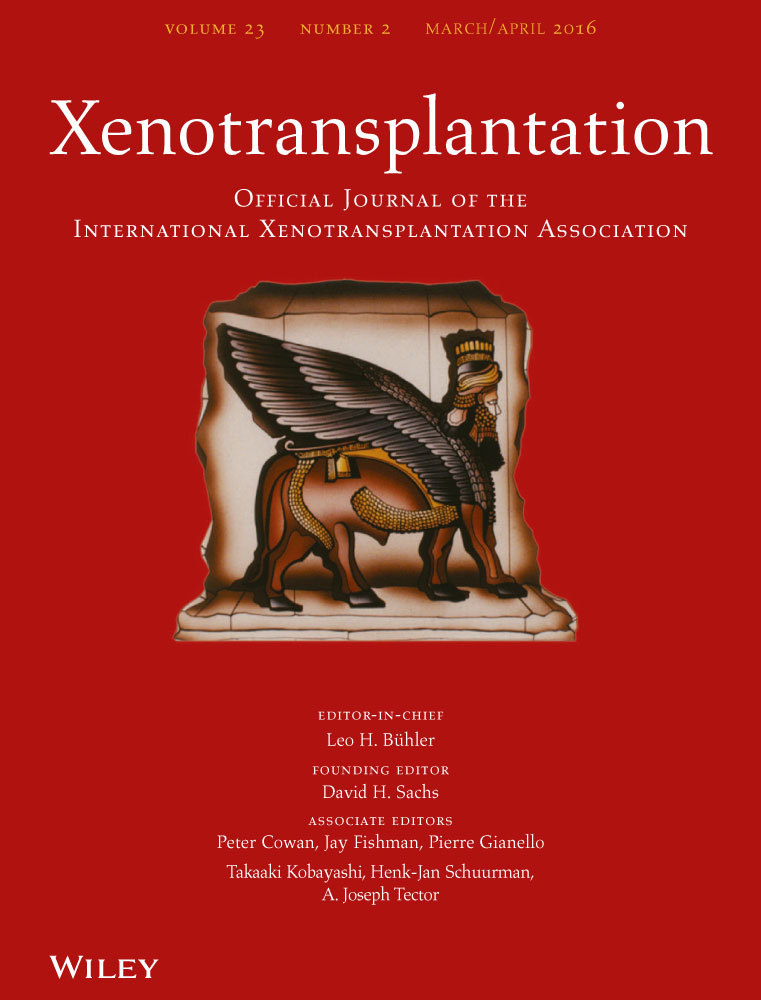Inhibition of complement component C5 prevents clotting in an ex vivo model of xenogeneic activation of coagulation
Abstract
Background
Xenogeneic thrombotic microangiopathy (TMA) and acute vascular rejection (AVR) prevent long-term survival of porcine xenografts after transplantation into non-human primates. Preformed xenoreactive natural antibodies (XNA) cause endothelial damage and activate the complement system. Mechanisms of xenogeneic coagulation and platelet activation are only poorly characterized.
Methods
A microfluidic flow chamber was used to study platelet activation and thrombus formation of human platelet-rich plasma (PRP) upon perfusion over wild-type (WT) or α-1,3- galactosyltransferase knockout (GTKO) and human CD46 (hCD46) transgenic porcine aortic endothelial cells (PAEC). Activation of plasma coagulation (thrombin–anti-thrombin complex; TAT) and complement (C3a, C5a) was studied in human platelet-free plasma (PFP) after co-incubation with PAEC. The activation of PAEC (E-Selectin, tissue factor, ICAM-1, ICAM-2, VCAM-1) was studied after incubation with human serum. Eculizumab (200 μg/ml) was used to inhibit terminal complement activation in all experiments.
Results
WT-PAEC perfused with human PRP showed thrombus formation at different shear rates (3 dyn/cm2: 23 ± 10%; 10 dyn/cm2: 17 ± 10% of flow chamber viewing field). GTKO/hCD46 PAEC exhibited reduced, but not fully prevented thrombus formation (3 dyn/cm2: 12 ± 12%). Porcine PRP caused little or no thrombus formation (3.0 ± 4% and 0.5 ± 0.9%, respectively). Flow cytometry of human platelets after perfusion over WT-PAEC revealed an increase in platelet CD62P expression (29.5 ± 3%), compared to non-perfused PRP (7 ± 2%) or PRP running through empty flow chambers (12.7 ± 0.3%). Incubation of human PFP with PAEC resulted in an increase of TAT that correlated with C5a activation. Specific inhibition of complement by eculizumab prevented thrombus formation (WT-PAEC: 1.6 ± 2% at 3 dyn/cm2 and 0.24 ± 0.33% at 10 dyn/cm2, GTKO/hCD46 PAEC: 0.2 ± 0.3% at 3 dyn/cm2) as well as activation of coagulation and platelets. Induction of endothelial E-Selectin and VCAM-1 in WT-PAEC upon incubation with human serum was significantly reduced by eculizumab. Eculizumab did not reduce thrombin generation capacity of human PRP or normal platelet aggregation.
Conclusion
Thrombus formation in this ex vivo model of xenogeneic TMA was closely linked with complement activation. Specific inhibition of complement C5 by eculizumab prevented endothelial cell activation, but also coagulation and platelet activation without compromising thrombin generation capacity of human blood or normal platelet function.




